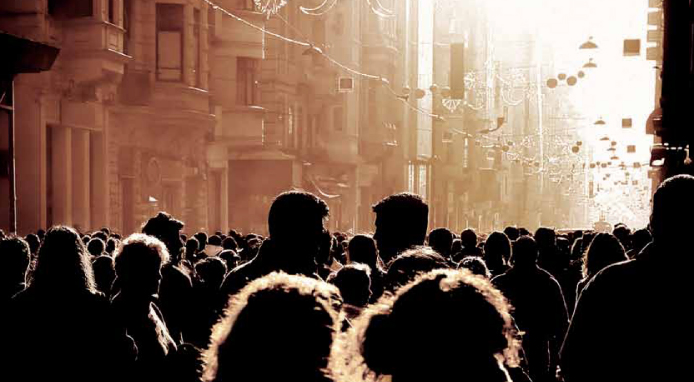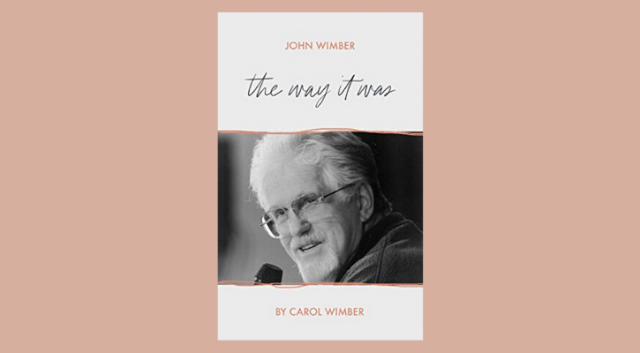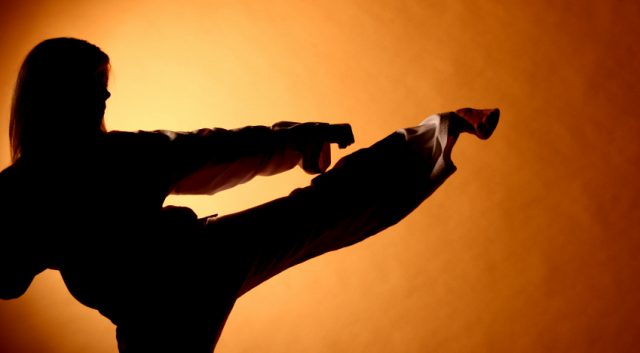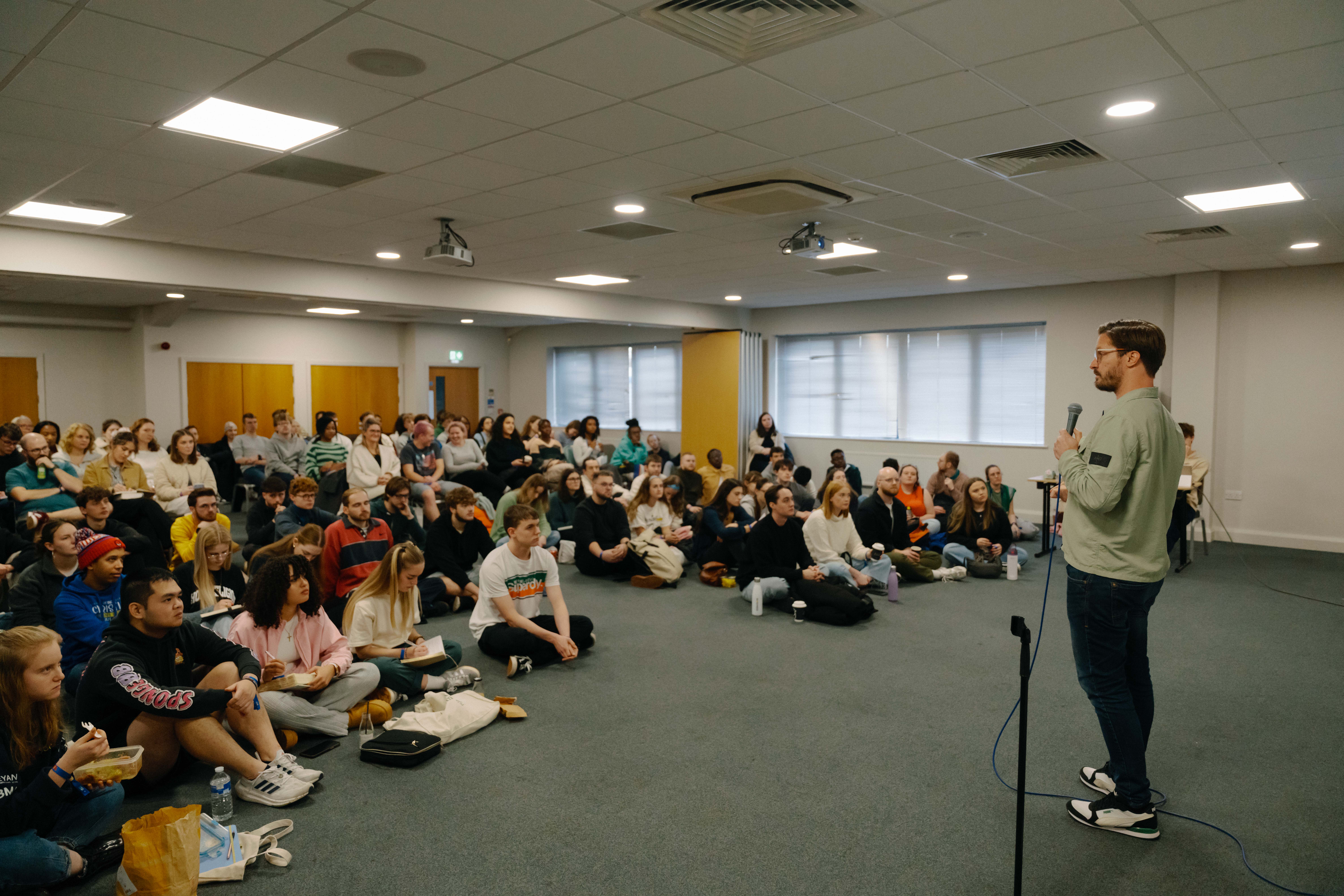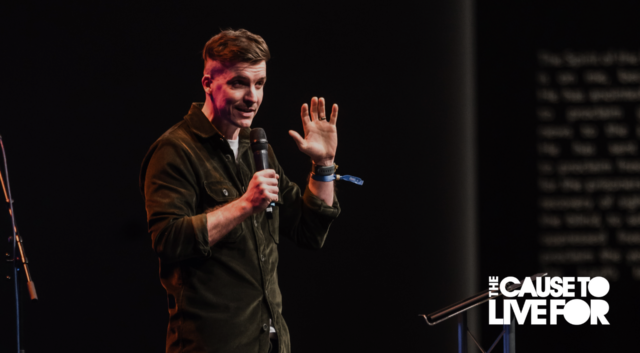Robby Dawkins is interviewed by ‘Cutting Edge’ magazine on the subject of Power Evangelism: High Risk, High Rewards.
CE: What do you mean when you talk about “power evangelism”?
Robby Dawkins: Power evangelism is using the “power gifts” – healing, prophecy, deliverance, and ministry of the manifest presence of God – to reach people. It can be outside or inside the church with people who are not believers. Power evangelism in action makes people curious about Jesus. They realize, “God is real, and he wants a relationship with me. He cares about my situation.”
Power evangelism literally brings God into their current situations
Those four areas of ministry make God very present in the moment. They’re the four things that I tend to use when I talk about power evangelism. But it also includes any kind of supernatural activity that brings people into a place of wanting to know more about Jesus.
CE: What makes power evangelism unique and powerful in people’s lives, as opposed to other kinds of evangelism?
RD: Power evangelism literally brings God into their current situations. It gives them something tangible to see and to recognize, even if they’re not specifically on the receiving end of the power.
We prayed for a guy about his kid’s heart problem, and there was another man with me that wasn’t really a solid Christian. He was teetering, coming to church because his wife wanted him to. But he was curious, so he came along. Now, this boy had seven holes in his heart. Every one of them closed up. He had no surgery. It was a documented miracle.
It blew away this man on the sidelines. He literally saw this listless child get up and run around like a completely healthy child. The child had never done that before. It was bizarre; God didn’t just heal the holes in the boy’s heart, but he also gave him strength instantly.
The great thing about power evangelism is that it makes God tangible to the individual.
CE: It sounds like a few very special people can participate in healing. God healed the boy’s heart through you. So what does that have to do with us? Many people think, “I don’t heal hearts. I don’t see visions for people.” How is power evangelism something universal that everybody can try?
RD: We have more power and authority than we realize, if we would try to use it. It’s like a debit card. We have an account, and we might not know exactly how much is on it.
I was in Armenia, speaking at different churches which were more Pentecostal. They would say, “You’re this special person that God has just blessed in that way.” I said, “No, I just try more often.” The more you try, the more you do see it happen. John Wimber said, “I had to pray for 1,000 people before one was healed.” The reason why I see more spectacular stuff is because I’m doing it more. I guarantee I have the same failure rate as everybody else.
But failure is not bad. Weight-lifting promotes failure, the actual muscle fatigue, because after the “failure” you begin to get stronger and your body is learning. If you don’t fail, you’re not learning. Each time that we pray and healing doesn’t happen, the failure is wrapped up in God’s sovereignty and in the fact that we have an enemy who is still ruling this world.
I guarantee I have the same failure rate as everybody else
There is more out there for us if we would keep pressing into it. I do agree that some people are a little more specially gifted, but it’s like anything else – some people are more gifted speakers, some are introverts and better at reflection, some are better at relating to others, and things like that. The Scriptures say we should all do the work of an evangelist. I think that means that we all have power. It’s just whether or not we’re using it. Going after it is crucial to seeing more things happen.
CE: When people talk about this, they either lay down a guilt trip, which is easy to reject, or they don’t push at all. You’ve hit this middle ground of, “Hey, you’re all right. God loves you. Try more.” So what could somebody do even tomorrow to start using that debit card? What are some of the “availability” examples you were talking about?
RD: One example is, I met a mother when I was out in Portland, Oregon a couple of weeks ago. She said to me, “You know, I’m not out with gang members like you are. I’m not out in the community. There aren’t a bunch of drug dealers that go to my church.”
I promise you I’ll see more healing with the non- Christians
Well, she had a mom’s play date the weekend I was there, and a woman came in who had a wrist brace on. So she prayed for her, and the lady’s pain level dropped halfway. She prayed again, and it dropped another quarter of the way. By the time she was done, the lady was only feeling a level-one pain when she started out with a level of ten.
That’s what we’re after. With anybody, in any situation, we are always around people who need prayer. These two women started a conversation. The woman who had had the wrist pain asked, “Why would God care about healing me?” The response can always be, “Because he loves you.”
We don’t earn or deserve God’s love. But if I had ten Christians and ten non-Christians, I promise you I’ll see more healing with the non- Christians. I can pray for them, but in order for me to see healing with the ten Christians, I’ve got to be showing God’s power to the non- Christians too. If God’s power is going to come back into churches, we’ve got to be showing it elsewhere as well. It could be in a grocery store, or at the gas station, or during reading time with the kids at the library. It gives the message, “This applies and it works.”
The further it is away from a religious or spiritual situation, the greater the response.
CE: Do you still feel very nervous about praying for strangers or your friends?
RD: There are different degrees. I actually feel more nervous when I’m asking somebody that I know goes to another church. If it’s somebody that I don’t know at all, it’s not always as bad, actually. If I’m asking my Catholic neighbor, or my Baptist neighbor, or my Evangelical Free neighbor, I am more nervous that they might have some opposition to it.
This is what we do. We have power, and this is what we do
CE: How long did it take until you didn’t feel nervous anymore? I feel like that’s the number-one reason people don’t try it.
RD: I think once you try it and it happens, you’re addicted. My 17-year- old goes almost every weekend, and the other day he led one of his buddies to the Lord. He had him out within two days praying for people on the street, and I said, “Son, give him a little chance to be a disciple.”
He said, “Dad, I don’t want him to get cold. He’s hot right now. And I also want him to know this is a culture. This is what we do. We have power, and this is what we do.” And I said, “You’re right. Go ahead.”
It’s developing a culture like the church culture in Acts. There was a culture of power, a culture of the presence that was there. It’s also reestablishing in us a culture of the knowledge of who we really are.
CE: You have a phrase: “Let’s take it to the streets.” That’s powerful, but a little vague. What do you mean by it?
RD: I just mean that you go outside of the church. “Take it to the streets” is going into the marketplace. At work. At the grocery store. When you stand at bus stops…a lot of people at our church ride the bus. They’ve had to learn to do shorter prayers, one or two minutes long. But we’re Vineyard people. We usually pray a long time! So we’ve had to bring that down a little bit in different circumstances.
But it can still be anywhere, at any time. We are surrounded by opportunities for the kingdom to break in, and that breakthrough can be hinged on our attempts.
CE: There are two things here. One is everyday life: “I’m going to work. I’m being aware of my normal surroundings.” But you also have intentional time where you go out for two hours and do something in the streets.
RD: There’s a group at least every week that goes out from our church, and every other week I go with them. People call us from other Vineyards and say, “Hey, can we go out with you? Will you take us out?” It’s almost like tours now, practically.
We go and break up into groups of two or three, no more than that. Then we just walk around downtown. Sometimes we’ll go into edgier places, like the bar districts. I like it, because the darker the environment, the more likely you’re going to see powerful stuff happen. It’s more of a contrast to what we see as the norm. You feel like the enemy is kind of whirling a little more, affecting people more in places like that. But it’s also where you’re more likely to see supernatural things happen.
Sometimes we’ll go downtown or to the mall or to Wal-Mart. We just approach people and say, “Hey, can we pray for you?”
We are surrounded by opportunities for the kingdom to break in
We also have an intercessory method. Some of our people are more wired for intercessory prayer, which means they’ll pray beforehand and ask God to show them places of pain. They’ll see a dolphin, and they’ll feel like they’re supposed to go to Wal-Mart and look for someone wearing something with a dolphin on it. Maybe the Lord shows them something about that—that the person has a knee problem. So they’ll see a man with a dolphin on his shirt, and they’ll ask him, “Do you have a knee problem?”
About 70 percent of those turn out accurate. At the very least, it starts a great conversation.
Those situations happen as part of intentional evangelism. But we also have the “as-you-go” method, which is how we refer to it. It’s a more naturally supernatural method.
CE: If you don’t have a vision about someone, or you don’t have anything to go on, but you want to be faithful…then what?
RD: I just go out and I just look for people at that point – period. I especially have a heart for the poor. I believe that poor people can get healed faster and will get touched by God faster. I’ll tend to get a prophetic word for them more quickly.
CE: So you’re going to Wal-Mart. You’re not going to Neiman Marcus or anything.
RD: Right. So I’ll just walk through and think, Okay, whoever I feel drawn to… I might see someone who’s limping, or somebody with a walker. I was at the pool with my kids, and we saw a woman with a leg shorter than the other. We prayed for her, and her leg grew out.
So I just look for things that are unusual or that jump out at me. I’ve realized that the more I do it, the more things I see. And I love seeing healing happen. Either I’ll look especially for people who need healing, or I’ll just walk up to someone and pray for them and trust that God will give me a word for them. It could be as simple as, “I really feel the Lord wants you to know how much he loves you.”
That’s actually the most powerful prophetic thing you can say to anybody. That’s what made Touched by an Angel such a popular TV show for a while. The story line didn’t matter. People wanted somebody looking at them through the canvas, saying, “God loves you.”
Whether I receive a word or picture beforehand or not, I usually approach people and say, “Listen, I love praying for people. I love seeing God touch people. Is there anything I can pray for you about? Any sickness? Do you need a job? You need financial help?” It doesn’t matter what they give me; just something to engage in with them. Honestly, the majority of people say, “No, I’m good. Thank you, though.” Then I say, “Well, could I just give you a blessing? And could I bless you right now?”
The majority of people will stop and say, “Yeah, yeah. You could give me a blessing.” I say, “Okay. Can I put my hand here on your shoulder?” I like to touch them if they are okay with it.
“Father, I just pray that you would just come right now and just bless So-and-So (I’ve gotten the person’s name by then). Would you minister to him and show them how much you love him? Father, would you come? Feed him with your presence. Overwhelm him with the reality of your blessing on him. Would you make your blessing known to him right now?”
There’s no way to eliminate the risk in order for things to happen.
The whole time I’m doing this, I’m using the five-step prayer model.
I will guide what’s happening, and then I’ll ask questions. Even if I suddenly know something, I’ll stop and ask questions because I don’t want to freak people out if I’ve been shown something about them. Like, I’ll stop and say, “Do you have a daughter? I see a picture of this younger woman, and I feel like she’s going through…” and I’ll tell them what I think is happening. If they don’t have a daughter, or maybe the girl was a niece or someone like a daughter, I still go ahead and give the word it seems that I received. Within that prayer for them, God usually shows up somehow.
The important thing is, all of this requires risk. There is no easy way. There’s no way to eliminate the risk in order for things to happen.
At the very least, if nothing happens – if you don’t get a picture, if you don’t get a word or anything – I’d still say 85 to 90 percent of the time, these people are hugely impacted by the fact that you would care. Right there is a demonstration of God’s power. That you would just care enough to want to pray for them says volumes. I have huge power stories, and I have small power stories, but yet, it’s just the fact that you would care.
I was praying for a guy who died in Puerto Rico. I prayed for him to be raised from the dead there on the street. But he was still dead. Fifteen minutes later, the cops were pulling me off. They said it could be a potential crime scene.
Yet, about 25 people were gathering around watching. People were crying. The pastor who was my host there in Puerto Rico said, “Do you know what they’re saying?” I said, “No.” And he said, “They’re so touched that you would care enough to try. They’re moved.” Ten of those people came to the church that Sunday. Two of them gave their lives to Christ. And nothing happened. No prophetic word, no raised guy from the dead, but two people gave their lives to Christ because somebody was willing to take a risk and cared enough to do it.
Even in the failure, success happens. Because we obeyed. Because we went. Our idea of success is the perfect healing: the perfect clear, prophetic word, the guy being raised from the dead, the being and believing in 20 minutes or less. That’s our idea of success.
But God’s idea of success is that we go, just because he said so.
CE: So, in sum, God’s power is available to us, even specifically outside of church. We can see that power come when we pray for our friends who aren’t churchgoers or when we happen to run into somebody who looks like they need prayer. But there’s also power in intentionally going places where we might have a chance to pray for somebody – and, at the very least, simply praying God’s blessing even if we don’t have some sense of healing or prophetic ministry. The bottom line is, underneath all of that, there is still risk and faith. No matter what the situation, if there is no risk and faith, there’s no opportunity for God’s power to come.
RD: So much authority and power is waiting on us. As people begin to do these things, they will begin to see things happen. I’ve seen people who have prayed and nothing happens. I guarantee you they stopped praying as a result. Remember, things are going to happen the more that you do them. It’s something that you grow in.
We mature in it! The more we persevere despite the resistance of things not happening, the more it is actually strengthening us. Satan tries the whole time to convince us, “You don’t have a prophetic ministry. You don’t have a healing ministry. You don’t have a deliverance ministry. You can’t go do these things.”
Perseverance is key…
You’re going to get discouraged. Things are not going to happen that you want to happen. The point is that you keep going, regardless. You will see it kick in and start happening again. I hit those points too. There have been several months in a row where I prayed and it seemed like nothing happened.
But I kept going for it. Perseverance is key. Press into it and say, “I’m sticking with it, no matter what, because I know it pleases the Father.”
I tell people that it’s like approaching an automatic door. If I stand 25 feet away and say, “I command that door to open in the name of Jesus,” or better yet, “God, if you’ll open that door, I’ll walk through it,” what will happen? Nothing.
Why? It requires proximity. If I approach the same door, what happens? It’s going to open because it senses my presence. I got close enough.
Now, there are times that I tried to walk through those automatic doors when they were locked, so to speak, and I’ve left many a lip and nose print on them because I bumped into them. But the next day I will still approach them as if they will open. Assume the doors are unlocked.
On the other hand, if I believe that I’m the ticket, that it’s up to my faith and my power, then I’ve bought into Satan’s message which says that you can be as God. It should not be contingent upon my belief in myself.
In truth, I will do it because God says to. Thinking of it that way, things will happen without it being a guilt manipulation. It’s an adventure. It’s exciting and addictive. I don’t do it because I think, “Oh, I have to do this to please God and get him off my back.” I do it because it’s a blast!
My 17-year-old son said it’s like Christmas every time. You don’t know what’s in the box, but you know either way it’s exciting. Even if nothing’s inside, it’s still exciting. Unwrapping it and opening it up to see what’s there – or not there – is fun.
CE: It’s low-pressure but high-risk.
RD: It is. That’s the ticket. I’m convinced that John Wimber picked up the the risk-taking from Lonnie Frisbee, who was a high risk-taker and knew more of the practice than the theology. But John learned both the theology and the practice. Once John caught on, I think he picked up and said, “Man, you can just go and go and go.” He kept expecting something to show up. And we’re seeing it all over the country. The feedback I get is fantastic. People say, “I never dreamed I could do this, and now I realize I can.”
My advice for any pastor or teacher or evangelist or leader is simply to give their people repeated permission to fail. People can say, “Look, it’s not going to happen some of the time. The results are God’s. They’re not mine.” Whether it happens or not, it’s all for him.
Robby Dawkins pastors the Vineyard Fox Valley in Aurora, Illinois, with his wife Angie. He teaches internationally about healing, deliverance, prophetic ministry and outreach.
